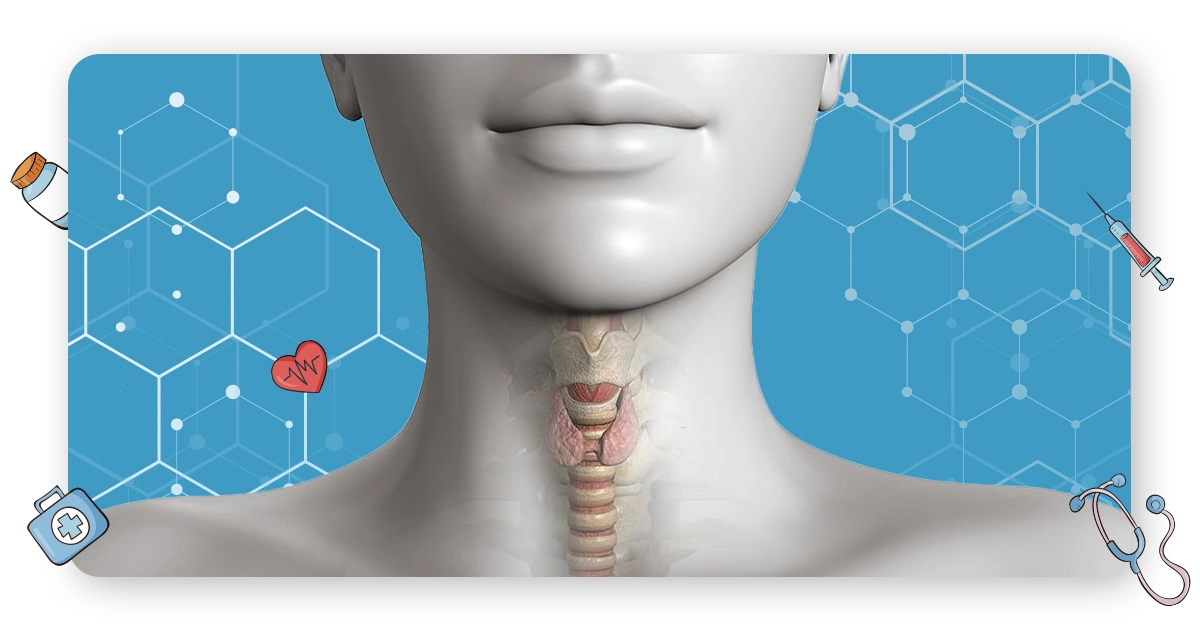Managing Thyroid Health During Pregnancy: Tips and Strategies

Do you know the importance of the thyroid gland? It is a tiny butterfly-shaped organ…
Do you know the importance of the thyroid gland? It is a tiny butterfly-shaped organ located in the front part of your neck. The thyroid gland is responsible for various functions in our body like metabolism, mood, heartbeat, and temperature.
When a woman becomes pregnant just like all the major body parts, the thyroid gland also undergoes changes to meet the growing demands of the new baby. But if those changes develop into thyroid imbalances then it could be potentially dangerous to both the baby and the mother.
Imbalances in the thyroid hormone are of 2 types.
1 . Hyperthyroidism
2 . Hypothyroidism
Hyperthyroidism is a type of thyroid imbalance in which the thyroid gland produces far more thyroid than the body requires. It is a condition in which the thyroid gland is unable to produce the adequate amount of thyroid required by the body.
The most common symptoms of thyroid imbalance in women include weight loss, increased heart rate, anxiety, and insomnia.
Patients with thyroid imbalances may also suffer complications related to pregnancy, such as premature birth, low birth weight, and even preeclampsia if proper care is not provided. (it is a severe condition that causes high blood pressure resulting in complications for both the baby and the mother).
Understanding Thyroid Health During Pregnancy
The number of thyroid patients in India is on the rise. It mostly affects women between the age group of 18-35. This is the age group when they are most fertile and this stage of thyroid disease is stressful for them.

Changes in the Thyroid Gland During Pregnancy:
The thyroid gland plays a very crucial role in pregnancy because it produces certain hormones which are necessary for the development of the baby.
During the first trimester of pregnancy, the thyroid gland goes through a lot of changes. One of these changes is that it gets bigger, which is called thyroid hyperplasia.
The thyroid gland is also responsible for the production of 2 types of hormones called T3 and T4. While the amount of T4 hormones increases a lot during pregnancy, the T3 hormones somewhat remain steady and do not rise as quickly as T4.
This rise of the T4 hormone is necessary for the growing baby
Difference Between Hyperthyroidism and Hypothyroidism:
Hypothyroidism occurs when the thyroid gland produces too much thyroid hormone than is necessary. Over 99% of the patients who suffer from thyroid have this type of thyroid. If a pregnant woman suffers from hyperthyroidism then it could lead to premature birth of the baby, miscarriage, or even preeclampsia.
There are certain symptoms from which women can identify hyperthyroidism. These are- weight loss, an increase in appetite, and tremors.
Hypothyroidism is a condition in which the thyroid gland is unable to produce the required amount of thyroid. During pregnancy, if a woman has hypothyroidism then it can often go undetected and it could lead to impaired growth of the fetus, causing intellectual disabilities in the baby. These signs of hypothyroidism include weight gain, dry skin, constipation, and exhaustion.
Potential Risks and Complications Associated with Untreated Thyroid Imbalances During Pregnancy:
Untreated thyroid disease can put both the mother and the unborn child at risk for serious complications during pregnancy.
Some of these risks and complications include:
- Preterm Birth
- Preeclampsia
- Miscarriage
- Developmental Abnormalities
- Postpartum Thyroiditis
Strategies for Managing Thyroid During Pregnancy
There are a lot of risks to both the mother and the baby which can arise from thyroid imbalance. Therefore it becomes necessary to undergo thyroid testing throughout the pregnancy.
TSH, T3, and T4 hormone levels are measured in the blood after a blood sample is drawn for the test.
Ideally, women should have their thyroid function tested before becoming pregnant to establish a baseline level. This can help identify any changes in thyroid function that occur during pregnancy. Women who have a history of thyroid disease or who have thyroid in their genetics are closely monitored by their doctors. As these are the type of women in whom the thyroid may resurface during pregnancy. If the doctors find thyroid imbalance during pregnancy, they usually suggest medicines to control the thyroid levels. The doses of these medicines are adjusted throughout the pregnancy to make sure that there is no thyroid imbalance.
Let us explore some tips for maintaining a healthy lifestyle to support thyroid function throughout pregnancy.
Tip #1: Eat a balanced diet
Eating a balanced diet is important not just during pregnancy but throughout life. A diet that is rich in protein, fiber, and healthy fats will ensure that your body parts work at their optimum level. It is also important to eat a healthy diet to combat thyroid health. Eating a balanced diet is crucial for overall health, but it’s especially important for thyroid health. Some specific nutrients that are important for thyroid health include iodine, selenium, zinc, and vitamin D.
Tip #2: Limit processed foods and sugar
Processed foods and sweet desserts are low in nutrients and heavy in calories. They contribute to inflammation and other health issues. Inflammation can be particularly problematic for thyroid health.

Tip #3: Exercise regularly
Regular exercise will make sure that your body weight is healthy and that thyroid imbalance does not occur. Exercise regulates metabolism and reduces the chances of inflammation, both of these are very important to maintain thyroid balance.

Medication:
This is the most common type of treatment available and most women who face thyroid imbalance can get treated with medicines.
Levothyroxine is a drug that is commonly found in thyroid-treating medicines. Although the doses of the medicines have to be adjusted throughout the pregnancy so that the thyroid remains within the range. Regular monitoring of thyroid function through blood tests can help ensure that medication dosages are adjusted as needed.
Surgery:
In rare cases, surgery may be necessary to treat thyroid dysfunction during pregnancy. This is only considered if a tumor is causing hyperthyroidism that cannot be managed with medication. In most cases, surgery is avoided during the first trimester because the chances of miscarriage are more at that time
Alternative therapies:
Some women may choose to explore alternative therapies to manage thyroid imbalances during pregnancy. These may include acupuncture, dietary changes, and herbal remedies.
To ensure the best possible outcomes, women need to work closely with healthcare providers throughout their pregnancy.
Working closely with healthcare providers can help ensure that thyroid function is closely monitored throughout pregnancy and that any necessary interventions are taken to maintain optimal thyroid function. Doctors recommend regular thyroid testing for women having a history of thyroid imbalance and if the tests are not satisfactory then the doctors start the treatment at the earliest.
Self-Care Strategies to Manage Thyroid During Pregnancy
Apart from the medical strategies to manage thyroid, certain self-care strategies can also help alleviate symptoms and improve overall well-being.

Stress reduction techniques:
Stress can have a negative effect on thyroid function. Women who suffer from thyroid imbalances can use these techniques to overcome stress:
- Meditation: Meditation involves focusing on any sound or thought with your eyes closed. You can chant OM. If you’re not sure how to meditate, then there are a lot of apps available which will guide you to meditate according to your level of expertise.
- Yoga: Now who is not aware of the benefits of yoga? Yoga includes a lot of stretching and balancing exercises all of which are beneficial for the body.
- Deep breathing exercises: For deep breathing, you can use certain apps. You have to close your eyes and count the number of seconds you breathe in and breathe out.
Adequate sleep:
Sleep is essential for overall health, including thyroid function. Women suffering from thyroid imbalance during pregnancy should aim to get at least 8 hours of sleep every single night.If you have trouble falling asleep then you can try these methods:
- Establishing a bedtime routine: A sleep time routine will tell your body to wind down and that it’s time to sleep. Having an early dinner, dimming the lights of the bedroom, staying away from the phone, etc are all certain habits you can incorporate to establish a routine.
- Avoiding caffeine: Having coffee, tea, or energy drinks can cause you to stay awake and interfere with your sleep. Don’t consume them during the 2nd half of the day.
- Creating a sleep-conducive environment: Creating a comfortable sleep environment can help promote better sleep. Women can try pregnancy pillows, keep the bedroom cool and dark, and reduce noise and distractions.
Mindfulness practices:
Mindfulness practices help reduce stress and promote relaxation. This is a relatively new term that many women might not be aware of. Mindfulness can be practiced in the following ways:
- Mindful eating: Mindful eating involves paying attention to every bite of the food. Chew the food properly. Smell it and enjoy its taste. Avoid distractions while eating such as watching TV or staying engrossed on a mobile phone.
- Body scan meditation: Body scan meditation involves focusing on different parts of the body and becoming more aware of physical sensations. This could be achieved while doing Yoga.
- Gratitude practice: Gratitude practice involves thanking the universe for even the tiniest thing that you would have ignored till now. For eg. Thank your house help for reducing the household chores for you, thanking the sun for bringing sunshine and positivity. Keep a gratitude journal and make sure to spend 5 minutes each day to express gratitude.
Staying informed and educated about thyroid health during pregnancy is important for several reasons.
- It is very important for women to educate themselves about the side effects that thyroid imbalance can cause. Using this knowledge women can take care of their health in a better way.
- Hypothyroidism can go undetected and its symptoms are also less subtle as compared to hyperthyroidism. By learning about thyroid imbalances women can recognize these subtle changes in their body and can get timely medical attention.
- There are multiple treatment options available for thyroid imbalance along with dietary changes as well. By getting equipped with the right knowledge women can work with their doctors and can decide upon the best diet and treatment that is suitable for them.
- By getting educated about thyroid imbalance and the importance of maintaining thyroid health women can advocate for the same and can help other people around them in recognizing their symptoms.
The final take is that it is very important to seek medical intervention in case of thyroid imbalance and get the treatment at the earliest.
Resources and Recommendations
his society comprises endocrinologists and certain other medical professionals who specialize in treating thyroid patients. Their website includes patient education materials, guidelines for healthcare professionals, and links to support groups.
ISAR is an organization that consists of doctors and medical professionals who specialize in infertility treatments. They also provide information about thyroid disorders and pregnancy.
Baby Center India is a very useful website for ladies who are pregnant. It has multiple resources and articles on pregnancy and postpartum.
Facebook support groups:
There are several Facebook groups that provide support and information for women with thyroid disorders during pregnancy. Some examples include “Thyroid Disease and Pregnancy” “Hypothyroidism 🦋 Support & Advice Group,” and “The Nest.”
Conclusion
Pregnancy is the most exciting phase of a woman’s life. But it also comes with a lot of responsibilities. Responsibility to take care of a new life even before it is born.
One of the most common thyroid disorders during pregnancy is hypothyroidism or underactive thyroid, which occurs when the thyroid gland does not produce enough hormones. This can lead to fatigue, weight gain, and other symptoms that can make it difficult to maintain a healthy pregnancy. The second type of thyroid disorder is hyperthyroidism or overactive thyroid, which occurs when the thyroid gland produces too much hormone, and can also cause complications during pregnancy, such as low birth weight and preterm labor.
The good news is that there are several strategies that can be used to manage thyroid health during pregnancy and ensure optimal outcomes for both the mother and the baby. Here are a few:
Staying in touch with the doctors and following their advice in treating thyroid will benefit both the mother and the baby. Here are some reasons:
Both the mother and the doctors have to work together to cure thyroid imbalance and pave the way for a better future for the baby and the mother.

